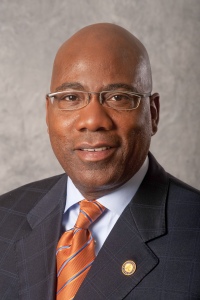About

David Wilson
Unintended Consequences: Higher Education Reform and HBCUs
Proposed national reforms to improve access to higher education are laudable, says Morgan State University president David Wilson AF ’84, but some elements of those reforms may adversely affect institutions most in need of help—such as historically black colleges and universities (HBCUs).
“I applaud President Obama for his very bold vision of putting before us in higher education this goal that America should lead the world again in the percentage of our population with college degrees,” says Dr. Wilson. “I also applaud him and Secretary Duncan for the Access to Success initiative to try to insure that the doors to higher education will remain open and affordable for students and for increasing the amount students can receive under the Pell Grant program.”
One change, however, has already had a drastic impact on enrollment at HBCUs. A 2011 revision to the Department of Education’s eligibility criteria for Parent PLUS Loans eliminated from consideration many applicants who would previously have been approved. Morgan, for example, saw a 44 percent drop in its applicants’ PLUS Loan approval rate. “There were many unintended consequences of that [change],” says Dr. Wilson. “That has translated into our having, on the campus, about 350 fewer undergraduate students than we had last year. And that has had a financial impact, because we are losing roughly $4.5 million from the university’s operating budget.” The solution, says Dr. Wilson, is to reverse the changes.
HBCUs will also be hurt, Dr. Wilson says, by a ratings system relying on retention and graduation rates. At HBCUs, he explains, a disproportionate number of students have financial reasons for dropping out. “A certain swath of historically black colleges could very well be in peril if we wake up and find ourselves with a system of funding institutions based on outcome measures that may not be a true measure of the worth of the institution.”
In the face of the recession, Morgan has already had to take creative steps to sustain tuition revenues by reducing time to degree and retaining students. A task force formed to identify obstacles to graduation has recommended such steps as a course redesign initiative to bring as many undergraduate degree requirements within 120 credit hours as possible. In gateway courses like math and biology, Dr. Wilson says, “We are calling upon professors to redesign some of those courses so we can get students to a degree of mastery quicker and consequently enable them to get through the institution on time.” Another key emphasis at Morgan: Fundraising that emphasizes assistance for students from families with limited resources.
Dr. Wilson is no stranger to change in higher education. He began his administrative career as a Woodrow Wilson Administrative Fellow at Kentucky State University during a time of transition, when finances required the school to diversify its all-black student body. (The process by which Kentucky State went about diversifying its student body ultimately became his doctoral dissertation topic at Harvard.) Created to help HBCUs meet demands for administrators, the Administrative Fellowship (1967–1990) recruited young leaders and scholars with expertise in development and financial management and placed them at schools in need.
A close professional relationship with then-Woodrow Wilson Foundation president Richard Couper led to Dr. Wilson’s becoming the Director of the Office of Minority Programs at the Foundation, where he learned from both Dr. Couper and Robert Goheen. “During lunch hour I would meander down to Bob’s office. He would regale me with all these incredible stories of the time when he was president at Princeton and how he led that institution during a very turbulent time when all the sit-ins and the movements were happening. And Dick would tell me stories of his being president at Hamilton and the New York Public Library. I was gaining all of this wisdom from two people who were at the top of their game. I emerged from the Woodrow Wilson Foundation without fully realizing that I had amassed this incredible perspective on higher education in America from some very, very good people.”
Dick Couper would later recommend Dr. Wilson for the post of associate provost at Rutgers University—Camden, launching Dr. Wilson’s career in higher education administration. “I owe a lot to the Woodrow Wilson Foundation for the opportunities that I have had since then and the experiences that are coming my way today.”

